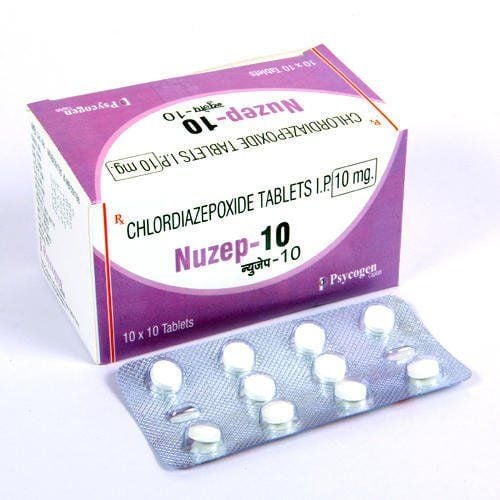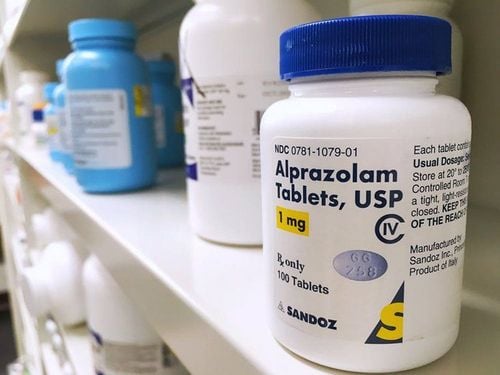This is an automatically translated article.
Lexapro (Escitalopram) belongs to a class of drugs called selective serotonin reuptake inhibitors (SSRIs), whose main use is to treat depression and anxiety disorders.1. What does Lexapro do?
Lexapro (also known as Escitalopram) is commonly used to treat depression and anxiety. Lexapro works by restoring levels of the hormone serotonin in the brain. Lexapro belongs to the group of drugs that help selective serotonin reuptake (SSRI), which helps improve energy levels and increase feelings of happiness, reduce stress and anxiety.
2. Dosage and usage
Lexapro is usually taken by mouth with or without food as directed by your doctor. Dosage is usually 1 tablet in the morning or evening. Dosage is based on the patient's medical condition, age, and response to treatment. It is necessary to inform the doctor about the products the patient is using (including over-the-counter, prescription and herbal products); If you are using Lexapro liquid, use a special measuring device or spoon to measure and get the correct amount of medication; To reduce the risk of side effects, your doctor may prescribe this medication at a low dose and gradually increase the dose. Follow your doctor's instructions carefully, do not increase your dose or take the medicine more often than directed by your doctor or on the label; Maintain taking Lexapro regularly to get the most benefit from it. To make it easier to remember your dosing schedule, take your pills at the same times each day. Even as you get better, keep taking your medication as prescribed. Do not stop taking the medicine on your own without consulting your doctor. Stopping the medicine suddenly can make your condition worse: mood/emotional changes, headaches, fatigue, sleep disturbances. To prevent these signs the dose should be reduced gradually. It is expected that it takes 1-2 weeks for the drug to start working and up to 4 weeks for the patient to feel the full effects of the drug. If treatment does not improve or worsens, notify your doctor immediately;

Người bệnh dùng một viên vào buổi sáng hoặc tối theo chỉ định của bác sĩ
3. Undesirable effects
Like many other drugs, Lexapro can also bring some side effects such as: Nausea, fatigue, dry mouth, trouble sleeping, constipation, dizziness and increased sweating. Tell your doctor if you have any serious side effects such as: decreased sexual interest, changes in sexual ability, easy bruising/bleeding. Get medical help right away if you experience serious reactions such as bloody or black stools, fainting, unusually fast heartbeat, vomiting of vomit that looks like coffee grounds, convulsions, swelling/pain/ red eyes, dilated pupils, changes in vision (blurred vision...). In rare cases, Lexapro can increase the hormone serotonin causing serotonin toxic syndrome. Get medical help right away if you experience any of the following symptoms: irregular heartbeat, hallucinations, loss of coordination, severe dizziness, nausea/vomiting, severe diarrhea, convulsions muscle, unexplained fever, agitation and restlessness. In rare cases, men taking the drug may experience pain and erections for 4 hours or more. Stop taking the medicine and talk to your doctor right away. Allergic reactions to Lexapro are also rare. However, if you notice any signs of a serious allergic reaction such as: severe dizziness, rash, difficulty breathing, itching/swelling (especially in the face, tongue, and throat area), inform your doctor. doctor and get medical help as soon as possible.
4. Be careful when using Lexapro
Before taking Lexapro, note the following:
If you are allergic to Lexapro, Citalopram or any other condition, tell your doctor right away; Talk to your doctor about your patient's medical history, especially bipolar disorder; personal or family history of suicide attempts, acute angle closure glaucoma, liver disease, epilepsy, intestinal/duodenal ulcers, low blood sodium (hyponatremia); Lexapro may also affect your heart rhythm (long QT syndrome) causing a fast, irregular heartbeat. Although rarely fatal, it can cause lightheadedness, dizziness, and fainting, and requires immediate medical attention. Therefore, as a precaution, you should inform your doctor if you have any heart disease (heart failure, bradycardia, QT prolongation in the electrocardiogram) or a family history of heart problems; Low blood levels of potassium or magnesium can also increase the risk of QT syndrome. This risk is increased if you are taking certain medications, such as diuretics, or are showing signs of excessive sweating, diarrhea, or vomiting. Talk to your doctor about how to safely use Escitalopram. Lexapro can cause dizziness, drowsiness or blurred vision, so patients should not use it with stimulants and alcoholic beverages. Do not drive, use machines, or do anything that requires alertness or concentration while the medicine is working; Lexapro liquid may contain sugar and/or aspartame. So if you have diabetes, phenylketonuria (PKU), or any other condition that requires you to limit or avoid these substances, ask your doctor about how to use them as safely as possible; Before surgery, it is necessary to inform the doctor about the products the patient is using (including over-the-counter drugs, prescription drugs and herbal products); Older adults are also more sensitive to the side effects of the drug, such as long QT syndrome, loss of coordination, and increased risk of falls and bleeding. If they are taking a diuretic with Lexapro, there is a high risk of hyponatremia;

Người bệnh trước khi dùng thuốc có thể nhờ sự hỗ trợ từ dược sĩ về cách dùng thuốc an toàn
Children may be more sensitive to drug side effects, especially loss of appetite and weight loss. The height and weight of the child should be closely monitored while taking the drug. For pregnant women, Lexapro should only be used when absolutely necessary. The drug can affect the unborn baby and cause problems for the baby such as: difficulty feeding, breathing difficulties, convulsions, muscle stiffness, constant crying. If you notice any of these signs in your newborn, contact your doctor right away. Mental/emotional problems (such as depression, obsessive-compulsive disorder, anxiety, panic attacks) that, if left untreated, can have serious consequences, so do not stop taking the medication unless indicated. doctor's decision. Before taking Lexapro, women of childbearing age should talk to their doctor about the possible benefits and risks and let your doctor know if you are pregnant or plan to become pregnant. For women who are breastfeeding, Lexapro can pass into breast milk and cause unwanted effects on a nursing baby, consult your doctor before taking the medicine.
5. Lexapro drug interactions
Drug interactions can change how a drug works or increase the risk of serious side effects. Therefore, the patient needs to inform the doctor about all the medicines he is taking. Also, do not use, stop, or change the dose of any medication without your doctor's approval.
Some drugs that may react with Lexapro include: drugs that can cause bleeding or bruising (such as anticoagulants such as Clopidogrel, NSAIDs such as Ibuprofen, blood thinners (such as Warfarin)); Aspirin can increase the risk of side effects if taken together. However, if your doctor has prescribed you to take low-dose aspirin (81-325mg/day) to prevent a heart attack or stroke, continue taking it unless your doctor tells you otherwise. MAO inhibitors (such as Linezolid, Isocarboxazid, Moclobemide, Procarbazine, Phenelzine, Safinamide, Rasagiline, Selegiline, Tranylcypromine ...) if taken with Lexapro can cause serious drug interactions, even death. Do not take MAO inhibitors 2 weeks before and after treatment with Lexapro. Tell your doctor if you are taking other products that cause drowsiness such as alcohol, antihistamines (such as Diphenhydramine, Cetirizine), sleeping pills or treatment for anxiety (such as Diazepam, Alprazolam, Zolpidem), muscle relaxants and Opioid pain relievers (such as Codeine). Many drugs besides Escitalopram can affect the heart rate (causing long QT syndrome) such as: Pimozide, Amiodarone, Procainamide, Quinidine, Sotalol and some others; Escitalopram has a similar effect to Citalopram, so do not take both drugs at the same time. Lexapro may affect the results of certain tests (such as brain scans for signs of Parkinson's disease). Make sure your doctor and laboratory staff know you are using this medicine.
6. Some notes about Lexapro
Overdose : If Lexapro overdose and you see symptoms such as fainting or shortness of breath, need to take the patient to the emergency room immediately. Missed dose: If you miss a dose, take it as soon as you remember. If it is almost time for your next dose, skip the missed dose. Do not take a double dose of medicine; Storage: Store the drug at room temperature, away from light and moisture. Medicines should not be stored in the bathroom. Keep medication out of reach of children and range of pets.
Please dial HOTLINE for more information or register for an appointment HERE. Download MyVinmec app to make appointments faster and to manage your bookings easily.












